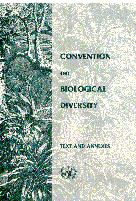Convention on Biological Diversity
The Convention on Biological Diversity (CBD), adopted at the 1992 Earth Summit in Rio de Janeiro, is one of the key agreements on a comprehensive strategy for sustainable development. The Convention has 193 Parties and three main goals:
- the conservation of biological diversity,
- the sustainable use of its components, and
- the fair and equitable sharing of the benefits from the use of genetic resources.
An initial Strategic Plan for Biodiversity 2011-2020 was adopted at the tenth meeting of the Conference of the Parties (COP 10) held in October 2010, in Nagoya, Japan.
Also the Nagoya Protocol voor Access and Benefit Sharing (ABS) was adopted in 2010. It addresses the third main goal of the convention. Earlier, in 2000, the Cartagena Protocol voor Biosafety was adopted.
Additional information on the Convention can be found on the CBD website
The Netherlands calls for a shift towards stronger, yet realistic, implementation of biodiversity goals, trough active collaboration with local and regional governments and the private sector including the financial sector. The Netherlands aims for strengthened efforts towards integration of biodiversity goals in other sectors. This concerns the agricultural and fisheries sector, but also industries in the food and non-food sector.
Within the CBD an initiative has been launched to showcase these bottom up initiatives: An agenda for action. For the initial Dutch initiatives in this respect see the report issued by IUCN NL based on their initiative to compile and catalyze pledges by Dutch companies, knowledge institutions, NGOs and citizens.
In December 2022 the Kunming-Montreal Global Biodiversity Framework (GBF) was adopted, containing goals for 2050 and targets for 2030.

